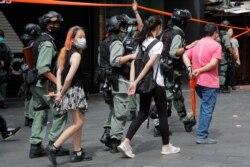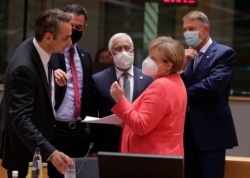Some forecast the dark cloud of the coronavirus pandemic would hold a silver lining — it would bring the world closer together.
Back in April, the World Economic Forum ran an article headlined: “A pandemic of solidarity?” And noted that as the virus continued to spread, “it’s bringing out the best in people across the globe,” adding that in Europe “people are singing to one another to keep spirits up.”
They were then, but the singing has now stopped.
Far from drawing the world closer together, it appears, if anything, to be having the opposite effect, all too often eroding the solidarity between allies and intensifying the enmity of foes. The world seems to be spinning apart, with the virus acting like a vast centrifugal force, warn analysts.
“We have seen nations across the globe turn inward and focus on containing the spread of COVID-19, taking unilateral steps to protect themselves with minimal global cooperation,” Denisa Delic of the charity Save the Children recently complained.
The world was out of sorts with itself even before the coronavirus. Established political orders were being challenged in ways not seen since the end of the so-called gilded age in the late 19th century or the 1930s, the decade of the Great Depression.
Writing in his pre-coronavirus book Age of Anger: A History of the Present, Indian essayist Pankaj Mishra argued that many people felt powerless, had lost faith in traditional political authorities to protect them or confidence in their ability to restore predictability. Resentment was rising at the increasingly unequal distributions of wealth and power. The economic shock, and reverberating aftershocks, of the 2008 financial crash were of even greater magnitude than experienced in the late ninetieth century, he noted, with “dangers more diffuse and less predictable.”
And that was before the deadly virus emerged, which is testing governments and countries like never before in modern peacetime history and adding new layers of unpredictability.
Uncertainty breeding polarization
The public health crisis has morphed into a multi-headed hydra of interlinked crises. Polarization has only deepened. Tens of millions have already lost their jobs and many more tens of millions are likely to lose their theirs. Governments of all types and persuasions are borrowing massively or burrowing deep into their reserves. International organizations have been wanting with mounting criticism of the World Health Organization.
“Only 12 years ago, the biggest financial crisis since the 1930s shook the global economy,” said Martin Wolf, chief commentator of Britain’s Financial Times. “Affected by how that was handled, the subsequent economic malaise and the perception that capitalism was rigged against them, the public in a number of high-income countries became angry.”
Wolf added in a recent commentary said that “mustering a concerted and effective global response is nigh on impossible” and he fears that the pandemic will leave in its wake even more polarized politics and “dreadful international relations.”
China, Russia
Trust is increasingly in short supply. China has seized the moment to try to gain political and economic advantage over rivals, say Western leaders, agitating in the South China Sea, clashing with India, punishing countries that backed a call for an international inquiry into the origins of the coronavirus and Beijing’s handling of the initial outbreak and cracking down on dissent in Hong Kong.
Along with Russia and Iran, Beijing stands accused by Western intelligence chiefs of launching aggressive state-backed cyber attacks aimed at stealing data from Western universities and pharmaceutical companies. And, according to U.S. intelligence officials, Russia and China are likely to seek to try to meddle in the upcoming U.S. elections.
“Foreign efforts to interfere in American elections is something we constantly must contend with, and we’ll contend with that here,” U.S. Secretary of State Mike Pompeo told Washington’s The Hill newspaper last week. He added America’s diplomats are working “to make sure our adversaries understand the cost imposed” if they try to interfere.
Christo Grozev, lead Russia investigator with Bellingcat, the investigative journalism website, warned recently that Russia’s troll factory in St. Petersburg, which sought to influence the outcome of the last U.S. election, has been honing its skills. The thousand or so trolls it employs have been instructed not only to plant disinformation but also to amplify on social media sites any fringe opinions in America, of either left or right.
On Monday, the intelligence and security committee of Britain's House of Commons warned in a report examining Russian influence operations: "The security threat posed by Russia is difficult for the West to manage as, in our view and that of many others, it appears fundamentally nihilistic. Russia seems to see foreign policy as a zero-sum game: any actions it can take which damage the West are fundamentally good for Russia."
A new global conflict is unfolding, analysts and diplomats warn, between the democracies of the West and the champions of autocratic capitalism in Beijing and Moscow.
A digital iron curtain looks likely to descend as a result. Democracies are fearful of the security risks and disruption the interlopers from China and Russia are threatening digitally, with apps and chips that can gather intelligence and social media sites that can be used to manipulate public opinion in rival countries. The autocrats want to seal off their populations and censor what can be read or seen on the Internet to try to tame dissent.
Strained friendships
But it is not only regional divides that are widening. The coronavirus is straining relations even within alliances. The 27 European Union countries agreed an ambitious economic recovery package Monday, but it took four stormy days of face-to-face negotiations which exposed old splits between the north and south of the continent as well as east and west.
Those present say the talks were among the most rancorous they have ever seen at an EU summit of heads of government and state. At one point the normally cool-headed German Chancellor Angela Merkel yelled at her Austrian counterpart. French President Emmanuel Macron banged the table in anger. Hungary’s Viktor Orbán, a former anti-communist dissident, accused the Dutch leader Mark Rutte of aping the Soviets in his bid to overcome dissent.
Latvia’s prime minister, Krišjānis Kariņš, tweeted, “The negotiations are difficult, perhaps one of the most difficult I have ever been involved in.” She added, though, an upbeat note, “yet the spirit of compromise has not yet disappeared.”
But some fear that it could evaporate under political and economic strain the next time the EU leaders gather, especially if a second wave of coronavirus infections worsen economic conditions and the contentious economic package has to be revisited.
Countries, increasingly untrusting of each other, are scrambling to ensure their own populations do not miss out on any vaccines that are developed. The U.S. was criticized in Britain for buying up stocks last month of remdesivir, one of the two drugs proven to work against COVID-19, the disease caused by the coronavirus.
Vaccine fight?
But the British government has been busy buying up as many doses it can get of potential vaccines as they are being developed, trying to hedge its bets. This week it announced it had secured at least 90 million doses of potential vaccine from overseas companies as it wagers on which one may prove successful, if a British one fails. Alok Sharma, the country’s business secretary, said on Monday, “We are doing everything we can to ensure the British public get access to a safe and effective coronavirus vaccine as soon as possible.”
Britain is not alone in angling for vaccine supplies. The fear of losing out is understandable. Peter Piot, head of the London School of Hygiene and Tropical Medicine noted recently that the world will need six billion doses of any effective vaccine that is developed and that there are not even the sufficient number of glass vials available to deliver the necessary doses.
Negotiations are being held internationally to find ways to ensure equitable access to any successfully developed vaccines, but few governments, especially those who have the financial wherewithal to earmark supplies, are willing to gamble on fair distribution in a world on edge.












